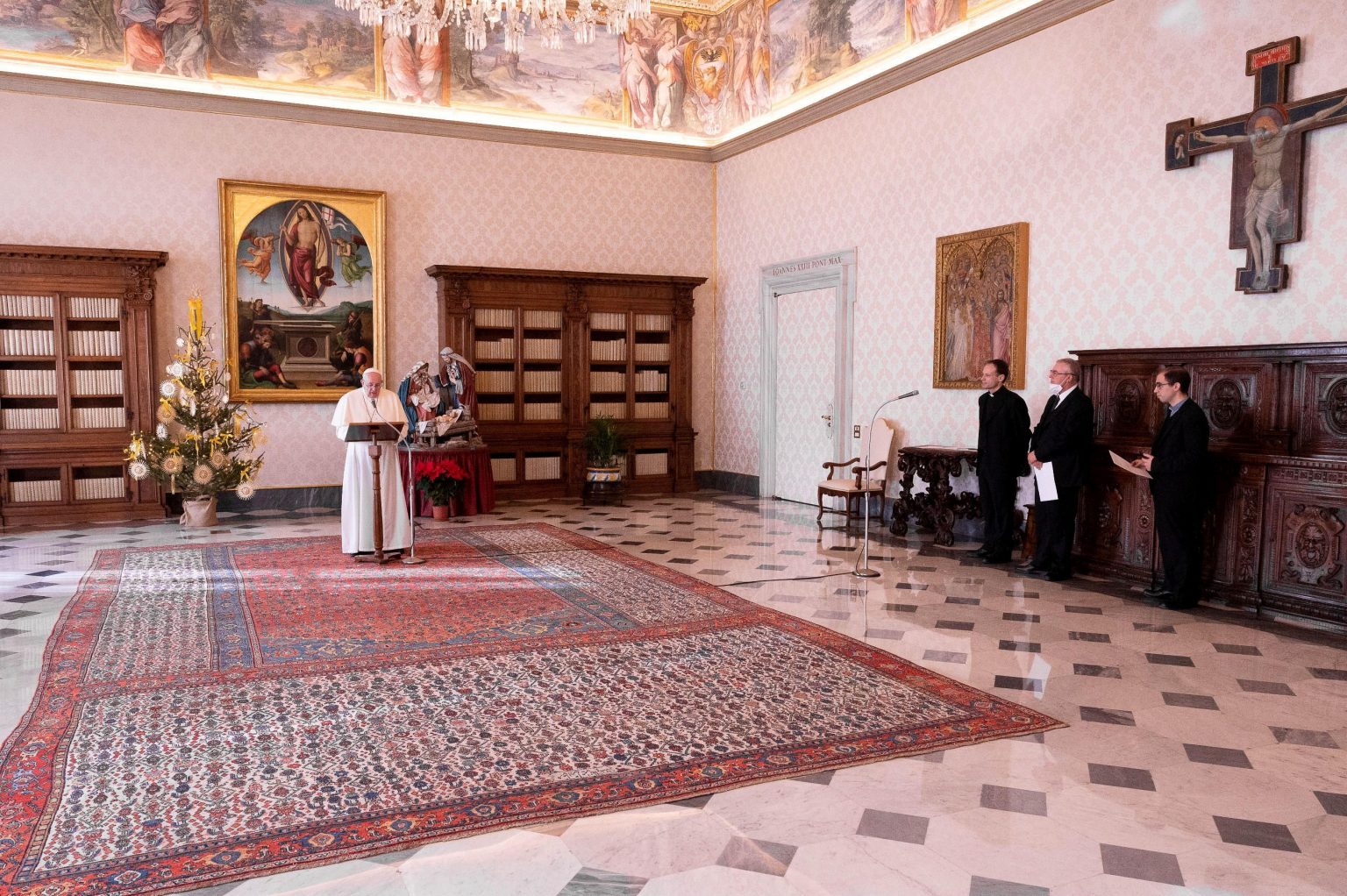Analyzing The Vatican's Financial Situation Under Pope Francis' Papacy

Table of Contents
The Vatican, a tiny city-state with immense global influence, has always been shrouded in a degree of financial mystery. Understanding the Vatican's financial situation is crucial, not only for its own stability but also for its role in the global Catholic Church. The papacy of Pope Francis has witnessed significant attempts at reform, aiming to increase the Vatican's financial transparency and address long-standing concerns. This article analyzes the key aspects of the Vatican's financial state during Pope Francis' papacy, examining both the progress made and the challenges that remain. We will explore Pope Francis' financial reforms, the persistent difficulties faced by Vatican finances, and offer an assessment of his lasting impact on the Vatican's financial health.
<h2>Reforms Implemented by Pope Francis to Improve Vatican Finances</h2>
Pope Francis inherited a complex financial landscape within the Vatican. His commitment to financial reform has been a hallmark of his papacy, aimed at enhancing the Vatican's financial transparency and accountability. Key initiatives include:
<h3>Establishment of the Secretariat for the Economy</h3>
In 2014, Pope Francis established the Secretariat for the Economy, a new body designed to centralize and oversee the Vatican's financial affairs. This marked a significant step towards improving financial oversight and transparency.
- Key Responsibilities: Consolidating financial reporting, developing budgetary procedures, and implementing internal controls.
- Initial Challenges: Resistance to change from some within the Vatican bureaucracy, a lack of clear lines of authority, and difficulties in standardizing financial practices across different Vatican departments.
- Notable Successes: Improved coordination between different Vatican entities, the implementation of more robust accounting systems, and a greater focus on financial planning.
<h3>Combating Financial Corruption and Money Laundering</h3>
Addressing financial corruption and money laundering has been a priority for Pope Francis. Several investigations have been launched, and new regulations have been implemented to strengthen compliance.
- Specific Examples: The investigation into the London property deal, efforts to strengthen anti-money laundering protocols, and the prosecution of individuals involved in financial irregularities.
- New Compliance Measures: Introduction of stricter auditing procedures, enhanced due diligence processes, and greater cooperation with international financial institutions.
- International Collaborations: The Vatican has increased its cooperation with international bodies like the Financial Action Task Force (FATF) to combat money laundering and improve its financial transparency.
<h3>Increased Financial Transparency and Accountability</h3>
Pope Francis has pushed for greater transparency in the Vatican's financial dealings. This involves making more financial information publicly accessible.
- Publication of Financial Statements: While still limited in scope, there have been attempts to publish more comprehensive financial statements, albeit with delays.
- Increased Audits: Independent audits have been conducted more frequently, improving accountability and providing external oversight.
- Measures to Enhance Transparency: Efforts have been made to improve communication about the Vatican's finances to external stakeholders, although further progress is still needed.
<h2>Challenges Facing the Vatican's Financial Stability</h2>
Despite the reforms, the Vatican still faces significant financial challenges:
<h3>The Impact of the COVID-19 Pandemic</h3>
The COVID-19 pandemic severely impacted the Vatican's finances, primarily through reduced tourism revenue and lower donations.
- Specific Revenue Losses: Significant declines in income from museum entries, guided tours, and other tourism-related activities. A drop in donations from parishes and individuals worldwide.
- Measures Taken: Cost-cutting measures, adjustments to the Vatican's budget, and reliance on reserves.
- Long-Term Financial Projections: The long-term financial implications of the pandemic are still being assessed, with ongoing uncertainty.
<h3>Managing the Vatican's Extensive Real Estate Holdings</h3>
The Vatican possesses a vast real estate portfolio, which presents both opportunities and challenges.
- Maintenance Costs: The considerable expense of maintaining historical buildings and properties requires significant financial resources.
- Potential for Revenue Generation: Strategic management of the real estate portfolio could generate substantial revenue through leasing, sales, or development.
- Strategies for Efficient Management: The Vatican needs to implement efficient management strategies to maximize the value of its property assets and minimize costs.
<h3>Maintaining Financial Sustainability in a Changing Global Environment</h3>
The Vatican faces broader economic challenges, including geopolitical instability and global economic uncertainty.
- Geopolitical Factors: Global conflicts and economic sanctions can impact donations and investments.
- Economic Uncertainty: Fluctuations in global markets pose risks to the Vatican's investments.
- Adaptive Measures: The Vatican needs to develop robust strategies to adapt to economic fluctuations and geopolitical risks.
<h2>Assessment of Pope Francis' Financial Legacy</h2>
Pope Francis' efforts to reform the Vatican's finances represent a significant undertaking.
<h3>Successes and Shortcomings</h3>
- Significant Improvements: Enhanced financial oversight, improved transparency, and increased efforts to combat financial crime.
- Areas Requiring Attention: The need for greater transparency in financial reporting, further strengthening of internal controls, and addressing the long-term financial sustainability of the Vatican.
- Overall Impact: The reforms have laid a foundation for improved financial management, though full implementation and long-term success require continued commitment.
<h3>Long-Term Outlook for Vatican Finances</h3>
The long-term outlook for Vatican finances depends on several factors.
- Future Revenue Streams: Diversification of revenue sources, greater efficiency in managing assets, and sustainable investment strategies.
- Effectiveness of Ongoing Reforms: Continued implementation and enforcement of reforms are critical for sustained improvement.
- Potential Risks and Opportunities: The Vatican must navigate geopolitical uncertainties and adapt to changes in the global economic landscape.
<h2>Conclusion</h2>
Analyzing the Vatican's financial situation under Pope Francis reveals a complex picture of both progress and persistent challenges. While significant reforms have been undertaken to enhance financial transparency and accountability, addressing long-standing issues and ensuring the long-term financial sustainability of the Vatican remain ongoing efforts. The effectiveness of Pope Francis' financial reforms will continue to be evaluated in the years to come. To stay informed about the ongoing developments in the Vatican’s financial management and the ongoing evolution of the Vatican’s financial reforms, continue to seek out reliable sources of information on the Vatican's financial situation and the ongoing efforts to improve the Vatican’s finances.

Featured Posts
-
 Bitcoin Price Rebound Analysis And Predictions
May 08, 2025
Bitcoin Price Rebound Analysis And Predictions
May 08, 2025 -
 Arsenal Psg Maci Hangi Kanalda Saat Kacta Canli Izle
May 08, 2025
Arsenal Psg Maci Hangi Kanalda Saat Kacta Canli Izle
May 08, 2025 -
 Rogues New Ability Cyclops Powers Emerge In Recent X Men Issue
May 08, 2025
Rogues New Ability Cyclops Powers Emerge In Recent X Men Issue
May 08, 2025 -
 Xrp Price Prediction Breaking Resistance And Hitting 3 40
May 08, 2025
Xrp Price Prediction Breaking Resistance And Hitting 3 40
May 08, 2025 -
 Lahore And Punjab Eid Ul Fitr Weather Forecast For The Next 48 Hours
May 08, 2025
Lahore And Punjab Eid Ul Fitr Weather Forecast For The Next 48 Hours
May 08, 2025
